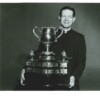Kon Ichikawa’s 1956 film The Burmese Harp is a powerful depiction of the spiritual journey of a Japanese soldier in Burma immediately following the end of World War II. Stephen Parmelee discusses the nature of this soldier’s search for meaning in the face of suffering; the parallels and differences between this soldier’s search and the…
Stephen ParmeleeJuly 15, 2011




















